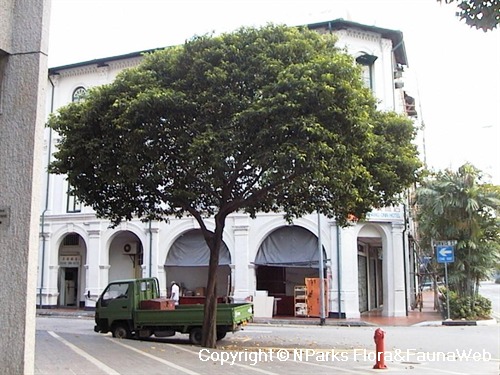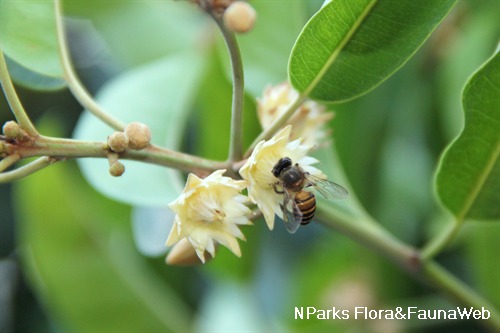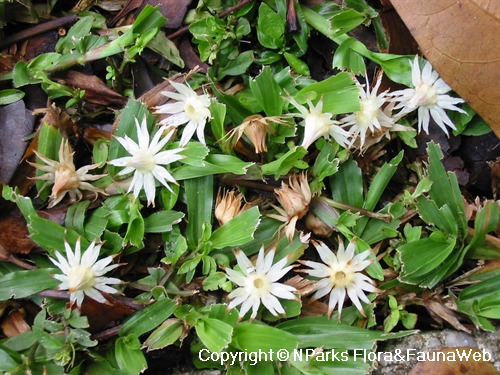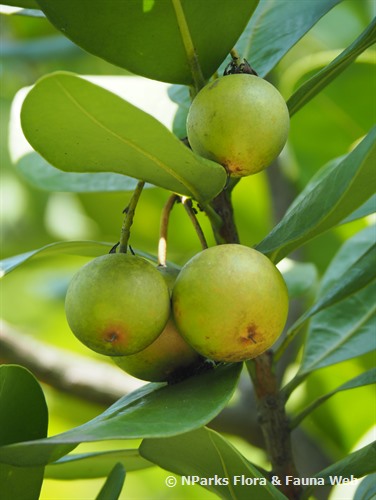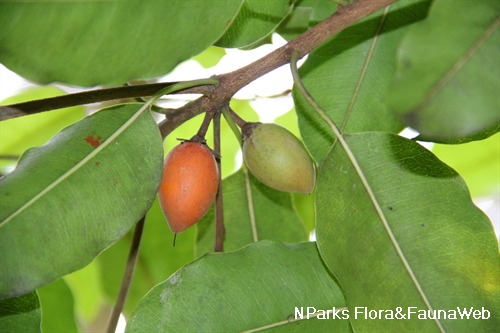
Back
Mimusops elengi L.
| Family Name: | Sapotaceae |
| Common Name: | Tanjong Tree, Bunga Tanjung, Red Coondoo, Tanjong, Spanish Cherry, Medlar, Bullet Wood, Bunga Mengkula, Mengkulah, Mengkulang |
Name
Classifications and Characteristics
| Plant Division | Angiosperms (Flowering Seed Plants) (Dicotyledon) |
|---|---|
| Plant Growth Form | Tree (Medium (16m-30m)) |
| Lifespan (in Singapore) | Perennial |
| Mode of Nutrition | Autotrophic |
| Plant Shape | Rounded |
| Maximum Height | 15 m |
| Maximum Plant Spread / Crown Width | 10 m |
Biogeography
| Native Distribution | India, Myanmar, Sri Lanka |
|---|---|
| Native Habitat | Terrestrial |
| Preferred Climate Zone | Tropical, Sub-Tropical / Monsoonal |
Description and Ethnobotany
| Growth Form | it can grow up to 15 m tall. |
|---|---|
| Foliage | The leaves are thick, oblong, simple, and spirally arranged, between 5-12cm long and 3-6cm wide. |
| Flowers | The flowers are very small, about 1.2cm wide, creamy-white, star-shaped and borne in small clusters on the leaf axils. They are bisexual, with 8 white petals, each with two side lobes, joined into a star-like corolla with 24 points and they fall off as a ring. There are 8 fertile stamens, alternating with 8 staminodes. The flowers open at twilight and gradually become very fragrant through the night, until the next morning when they are shed. |
| Fruit | The fruits are oval, pointed and similar in size to small olives (2-3cm long). They turn from green to orange-red when ripe. The seeds are dark brown or black, and are surrounded by edible yellow flesh. |
| Others - Plant Morphology | This is a small, bushy tree with a conical shaped crown when young, and a dense, bushy, rounded crown when mature. Landscaping Use:The Tanjong Tree is commonly planted along roadsides in Singapore, especially in residential estates, as its compact size makes it highly suitable for narrower planting verges, and it also has the added attraction of bearing fragrant flowers.Ethnobotanical Use:The flowers are used for adornment and to distill scented water in India. The leaves, flowers, bark and seeds are variously used in local medicines in the Malay Archipelago. |
| Ethnobotanical Uses | Edible Plant Parts : Edible Fruits Medicinal: In Malaysia the bark is used to treat fever, pimples and diarrhoea; and the leaves for headache. The Indonesians smoke the leaves to get relief from asthma and apply the bark to treat itch, rheumatism and gonorrhea. Extract of flowers used against heart diseases, leucorrhoea, menorrhagia and act as antiduretic in polyuria and antitoxin. Cultural / Religious: Heritage Tree: There are currently 2 individuals of Mimusops elengi listed as Heritage Tree in Singapore. One can be found on Sentosa while the other in Hougang. To find out more about these trees, please visit the Heritage Tree Register. |
Landscaping Features
| Desirable Plant Features | Fragrant (Flowers) (Night, Dawn / Dusk, Day) |
|---|---|
| Landscape Uses | General, Suitable for Roadsides, Parks & Gardens, Coastal |
Fauna, Pollination and Dispersal
| Pollination Method(s) | Abiotic (Wind) |
|---|---|
| Seed or Spore Dispersal | Biotic (Fauna) (Vertebrates (Bat), Vertebrates (Other Mammal)) |
Plant Care and Propagation
| Light Preference | Full Sun |
|---|---|
| Water Preference | Moderate Water |
| Plant Growth Rate | Moderate |
| Rootzone Tolerance | Well-Drained Soils, Fertile Loamy Soils |
| Maintenance Requirements | Moderate |
| Propagation Method | Seed, Stem Cutting |
| Seed / Spore Germination Duration | 17 days to 82 days |
| Seed / Spore Germination Rate | 70% to 90% |
Foliar
| Foliage Retention | Evergreen |
|---|---|
| Mature Foliage Colour(s) | Green |
| Mature Foliage Texture(s) | Smooth, Thick |
| Foliar Modification | Stipule |
| Foliar Type | Simple / Unifoliate |
| Foliar Arrangement Along Stem | Alternate, Spiral |
| Foliar Attachment to Stem | Petiolate |
| Foliar Shape(s) | Non-Palm Foliage (Ovate, Elliptical) |
| Foliar Margin | Entire - Wavy / Undulate |
| Foliar Apex - Tip | Acuminate |
| Foliar Base | Rounded / Obtuse |
| Leaf Area Index (LAI) for Green Plot Ratio | 4.0 (Tree - Dense Canopy) |
Non - Foliar and Storage
| Trunk Type (Non Palm) | Woody |
|---|---|
| Mature Bark Texture | Fissured, Peeling / Flaking / Papery |
| Stem Type & Modification | Woody |
Floral (Angiosperm)
| Flower & Plant Sexuality | Unisexual & Bisexual Flowers(Sub-dioecious) |
| Flower Colour(s) | White |
|---|---|
| Flower Grouping | Cluster / Inflorescence |
Fruit, Seed and Spore
| Mature Fruit Colour(s) | Orange, Red |
|---|---|
| Mature Seed Colour(s) | Brown, Red |
| Seed Quantity Per Fruit | Few (1-5) |
Image Repository
Others
| Master ID | 1737 |
|---|---|
| Species ID | 3030 |
| Flora Disclaimer | The information in this website has been compiled from reliable sources, such as reference works on medicinal plants. It is not a substitute for medical advice or treatment and NParks does not purport to provide any medical advice. Readers should always consult his/her physician before using or consuming a plant for medicinal purposes. |

